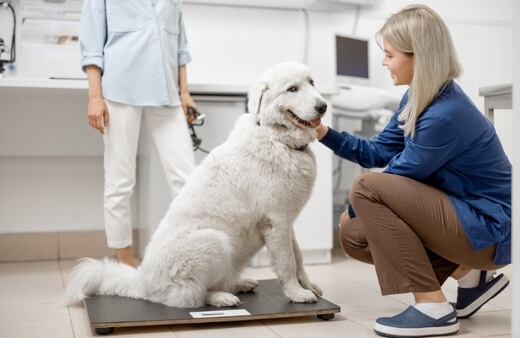Dogs love to explore their surroundings and will put their mouths in basically everything that they come across. Therefore, it’s essential to remember that dogs will probably be carrying parasites, which is why you need to deworm them at a recommended frequency.
Deworming requires prior knowledge, and you shouldn’t do it without knowing what is happening. Dewormers are available in various forms, including liquids, tablets, and injections.
More...

There is a frequency at which you should give dewormer to your dog and a way of giving it. A common question any owner has is, ‘Can I give my dog a dewormer if he doesn’t have worms?’
If you also want to find out the answer to this question, you have come to the right place. This post explains many factors regarding dog dewormers and how you should give them to your dog.
What is a Dog Dewormer?
A dewormer is a medicine that can treat parasitic infections in animals, including dogs. A dewormer kills the parasites that cause diseases in these animals. Dewormer is used to treat both external and internal parasites.
However, the more common use is in treating internal parasites such as roundworms, tapeworms, and hookworms. You should treat worms in your dog as they could cause harm to not only itself but others around it, including your family members and other pets.
If you are welcoming a new dog in your home, it is essential to know whether it has already been dewormed or not.
Here are other considerations when adopting a dog.
How Does Dewormer Work?
A dewormer can work in two ways when administered to a dog. It can directly kill worms or expel them from the dog’s body. Some dewormers also paralyze the worms, which causes them to be expelled from the body when the dog passes stool. Some dewormers cause the worms to be dissolved in the dog’s abdomen.
These are the many ways dewormers work to eliminate parasites from a dog’s system successfully.
When to Deworm Dogs?

If your dog already has worms and you consulted a vet, he would have recommended a dewormer course. Typically, puppies must be dewormed every two to four weeks. After that, you can deworm them every three to six months.
Adult dogs must be dewormed at least every three to six months.
Can I Give My Dog Dewormer If He Doesn’t Have Worms?
If you give your dog dewormer even when it doesn’t have worms, it will not cause any harm to it. The dewormer will get digested and cause no harm unless you give it in large amounts compared to the recommended dosage.
Common dewormers for dogs are intestinal or hookworm dewormers that dogs usually need. Most dewormers are safe for dogs of any age, so you can even give them to a puppy.
However, you must follow the instructions given in the packaging and consult your vet before giving your dog a dewormer.
What Happens If You Give Your Dog Too Much Dewormer?
You need to be careful when giving your dog a dewormer. Giving a dewormer 10x to 30x times above the recommended dosage can cause many side effects in dogs.
Here are the side effects of giving your dog too much dewormer:
- Vomiting
- Diarrhea
- Lethargy and weakness
- Skin irritation
- Stomach ulcers
- Kidney damage
- Liver damage
Extreme cases of dewormer overdose could cause kidney and liver damage that could ultimately lead to death.
If your dog was recently dewormed and you didn’t see any signs of worms in its poop, skin, or anywhere else, you need to be extra cautious. In such instances, waiting for a minimum of 15 days after the initial dose is recommended.
Deworming your dog regularly ensures safety, but always follow the recommended dosage.
How To Keep Your Dog From Getting Parasitic Infections
Ensure to keep an eye on your dog, especially when you go out for walks with it. You must ensure that it doesn’t go roaming around picking everything up and putting these in its mouth.
Make use of dog collars and GPS trackers to keep check of your dog’s whereabouts. Prevention is better than cure, so avoiding situations that can cause worms to enter your dog’s system is better.
Signs That Indicate That Your Dog Has Worms
Each parasite has a different impact on dogs. However, you should be aware of a few common warning signs. Here are the signs that indicate that your dog has worms.
- Pain in the abdomen
- Diarrhea
- Vomiting
- Loss of appetite
- Appetite shifts
- Coughing
- Dehydration
- Lack of energy
- Poor-looking coat
- Having a pot-bellied appearance
- Pale gums
- Anemia and nutritional deficiencies
- Stool with blood
If you see any of the signs above, it’s best to consult your vet. He will be able to prescribe adequate doses of dewormer medication so your dog can return to normal soon.

How Long Should You Wait Before Feeding Your Dog After Deworming?
Your dog may be vomiting soon after receiving the dewormer dose. It is commonly seen when administering oral treatments to dogs. So, if your dog has a habit of snacking often, you must keep an eye on it.
Your dog may not have an appetite soon after receiving deworming treatment. It is entirely normal and nothing to worry about. However, you must check if your dog wants to eat two to three hours after the dewormer treatment.
The best way to encourage your dog to eat after receiving dewormer treatment is to offer its favorite food. Not only will your dog be motivated to eat, but this will also help it feel better.
How Long Do Deworming Treatments Take To Work?
The time it takes for the deworming treatment to work and show its effects can change from dog to dog. If your dog has processed the intestinal parasite medication, it may take effect immediately.
Most dewormer treatments work fast and eliminate intestinal worms within two to six hours after applying the dewormer.
However, it can differ based on the intensity and type of parasite infection being treated. Based on these factors, some dewormer treatments could take up to two weeks to make a dog worm-free.
What To Expect After Giving Your Dog A Dewormer
Your dog may pass out dead worms in its feces after receiving the deworming treatment. Although it may look unappealing to you, it is entirely normal and is to be expected. Sometimes, the worms may move and show signs of activity. However, they will ultimately die.
Besides these signs, your dog may also show a lack of appetite immediately after treatment. It is because your dog’s body is fighting against the parasites. It may also have vomiting and nausea.
Your dog may show discomfort for up to 24 hours after receiving treatment. However, if the symptoms persist for over 24 hours, you must consult a vet.
Common Mistakes Owners Make When Deworming Their Dogs
As much as keeping your dog free from parasites is essential, you should also do it correctly. If not done correctly, it could affect your dog and your family members.
Here are some of the common mistakes people make when deworming their dogs.
Administering Medication Without Considering The Dog’s Weight

The correct dose you have to administer depends on the dog’s weight. Most people consider the dog’s weight when it was last dewormed and proceed accordingly. It is one of the main reasons that lead to overdose and underdose.
So, ensure you weigh your dog before you administer deworming medication. If you cannot weigh your dog, you can use anti-parasitics with formulations with weight range classifications. It ensures that you are administering the correct dose.
Forgetting To Re-Administer Deworming Medication After A Few Days
Most owners give their dogs the first dose of anti-parasitic medicine and completely forget it afterward. They fail to remember to give the second dose, which must be administered 15 days after the first.
Oral anti-parasitics remain in the dog’s body only for a few hours. So, it is vital to re-administer it every two weeks for the best results. Now, new dewormer medications remain active for one month once applied to the dog’s skin. So they do not need to be re-administered right away.
Deworming Your Dog On Your Own
It is one of the most common mistakes made by dog owners. Once they realize their dog needs to be dewormed, they buy an anti-parasitic medication and administer it to their dog without consulting a vet.
During a consultation, the vet examines the dog’s physical status, lifestyle habits, weight, and a few other factors before deciding which medication suits it. Always consult your vet to stay up to date on your dog’s health plan and to protect it from parasites.
Deworming Only One Dog When You Have More
It is another common mistake made by pet owners. Most of them tend to deworm only one dog when there is more than one at home. Or, they don’t deworm them all at the same time.
It is also similar to partial and ineffective deworming. It puts the dewormed dog’s and other dogs’ health at risk. If you have more than one dog at home, ensure to deworm them all at the same time.
Dog Dewormer Frequently Asked Questions
How do you know if your dog needs a dewormer?
Some of the most common signs that indicate your dog needs a dewormer are vomiting, diarrhea, lethargy, chronic coughing, weight loss, and dulling of the coat.
When should you give your dog dewormer?
Puppies must be dewormed every two weeks until they are twelve weeks old and then monthly until they are six months. After that, they can be dewormed like an adult dog every three to six months.
Can too much dewormer hurt a dog?
Giving your dog too much dewormer can cause side effects like diarrhea and vomiting.
Now You Know When to Use a Dog Dewormer
Deworming your dog is essential for its health. You can even deworm a healthy dog that doesn’t have worms. It won’t harm the dog if you don’t go above the recommended dose.
Too much dog dewormer could cause side effects like vomiting, diarrhea, and even liver and kidney damage, in dogs.
